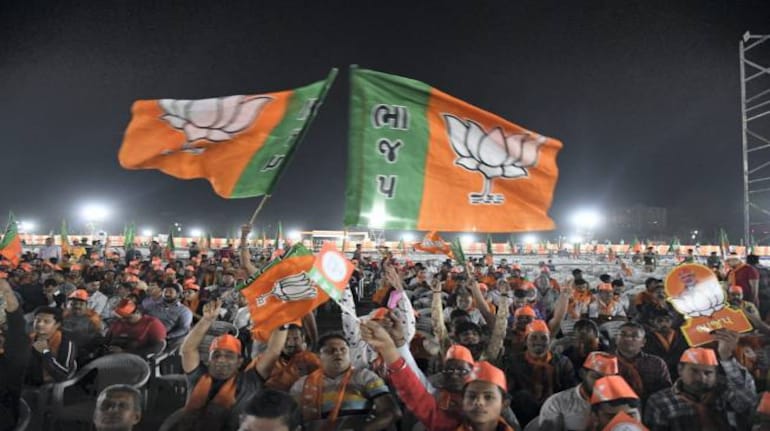



Ironically on a day when a significant electoral outcome was celebrated among sections as a “victory of secularism over communalism”, Prime Minister Narendra Modi invoked secularism in his speech at Gandhinagar. “I understand that true secularism is where there is no discrimination (of caste, creed or religion). For those who talk about social justice, I think there is no social justice greater than working for the happiness and convenience of all, for 100 percent of their rights. Yes, this is the path on which we are walking,” he was quoted saying.
Modi’s summoning of secularism was interesting considering that the BJP has disparaged and ground to dust the word. The Congress’s manifesto for the Karnataka elections promised to ban the Bajrang Dal as well as the Popular Front of India for provoking “communal enmity and hatred”. The Union home ministry has already proscribed the PFI.
Hindutva Didn’t WorkBut the Congress’s “promise” came as electoral fodder to the BJP which equated the impending ban on the Bajrang Dal as an assault on Hanuman or Bajrangbali. In one of his last roadshows, PM Modi spoke at length about the Bajrang Dal and Bajrangbali as one entity.
Confronted with a rout in the Karnataka elections, the BJP’s claim that Modi’s blitzkrieg had changed the flow of electioneering by turning people’s mood in the BJP’s favour stands contested. The Congress was panned for raking up a faith-based issue amid a campaign that focused on local issues impinging largely on the lives of the poor and the less well-off. It appeared at one point that issues such as price rise and unemployment would be overwhelmed by Bajrangbali.
Read more on our Karnataka Election Results coverage here
However, the outcome exposed the limitations of pursuing a faith-driven agenda meant to polarise the communities. A defining feature of the Basavaraj Bommai dispensation was the adoption of policies and moves designed to foster Hindutva.
Whether it was a ban on the hijab worn in schools and colleges, the attacks on hijab-wearing students forcing many of them to forsake their studies, the resurrection of old and nearly-forgotten temple-mosque disputes, the crackdown on shops selling meat and poultry during Hindu festivals and finally equating the call for a ban on Bajrang Dal with outlawing Hanuman himself, the CM spared no effort to promote the Hindutva programme. At one point, it appeared as though Karnataka was competing with Uttar Pradesh and Madhya Pradesh for a position as a premier Hindutva state.
That outlook was not endorsed by voters. The BJP will have to introspect on why voters in the states to the south of the Vindhyas continue to draw a line between religion and politics. Karnataka, like Tamil Nadu, is deeply religious. It was among the early supporters of the call for a Ram temple at Ayodhya and never failed to send contingents of “kar sevaks” when the occasion demanded. Yet come an election, livelihood issues took precedence over faith.
That explains the significance and salience of the veteran leader BS Yediyurappa, the architect of the BJP in Karnataka. He consciously cultivated his image as a leader of the peasants and made farming the centrepiece of his governance in his tenure as the chief minister. Bengaluru and its IT cachet notwithstanding, Karnataka is largely a rural state and farmer-friendly budgets of the kind Yediyurappa passed when he was the CM went a long way in consolidating the BJP’s presence in the villages.
With the benefit of hindsight, the BJP might ask itself if it was prudent to replace Yediyurappa mid-stream as the CM with Bommai, who quit the Janata Dal (United) in 2008 to join the party. The BJP’s rationale was it had replaced one leader from the dominant Lingayat community with another so there was no collateral. It did not realise that by then Yediyurappa had transcended his Lingayat provenance and was perceived in broader terms as a leader of the farmers across castes.
It is not easy for any party to make a leader but easy to unmake them, as Indira Gandhi did at the height of her power and glory but at an enormous cost to the Congress. It’s a template a party can adopt only on peril. Karnataka should offer a salutary lesson to the BJP on the disadvantages of over-centralisation. There are important state elections at the end of the year and the BJP has muddied the waters in at least one, Rajasthan.
State leaders command a big premium in Rajasthan. Bhairon Singh Shekhawat dominated the BJP for decades but when he was replaced, the transition happened seamlessly because Vasundhara Raje was promoted and projected as a state leader with Delhi’s unqualified backing.
The present BJP dispensation is ambiguous over retaining Vasundhara, cherry picks alternate names but has still not mustered the courage to bring one of them upfront because Vasundhara has made it clear that on the ground she matters.
Likewise in Madhya Pradesh, Shivraj Singh Chouhan might not be a favourite of Delhi but he is the only recognisable and acceptable leader in the state that also goes to polls in December. Caste equations doubtless influence voting but these factors kick in when there are leaders who carry castes and communities with them.
Radhika Ramaseshan is a senior journalist and columnist. She was the political editor at The Telegraph. Views are personal and do not represent the stand of this publication.Discover the latest Business News, Sensex, and Nifty updates. Obtain Personal Finance insights, tax queries, and expert opinions on Moneycontrol or download the Moneycontrol App to stay updated!
Find the best of Al News in one place, specially curated for you every weekend.
Stay on top of the latest tech trends and biggest startup news.